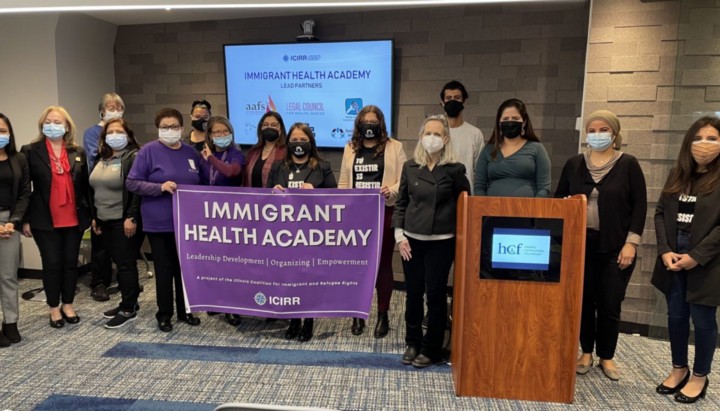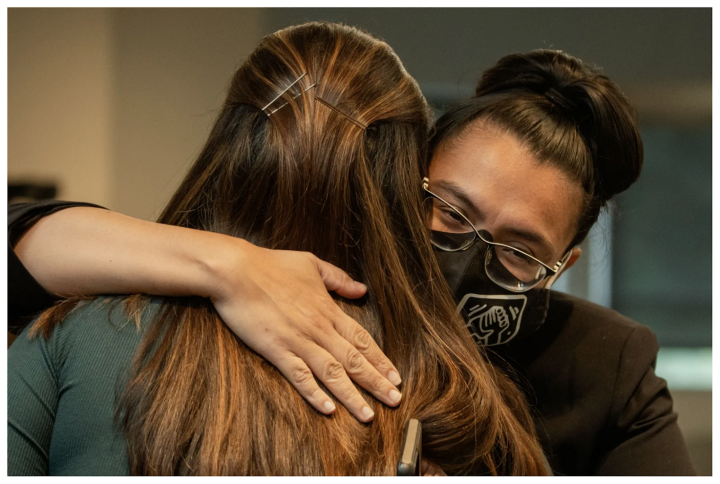Power Building with Race Equity and Health Justice at the Center
Executive Director Emily Stewart on Community Catalyst’s Restuccia Health Justice Fellowship Program.

Community Catalyst is dedicated to advancing a movement for health equity and justice by transforming our health system into one that is shaped by and accountable to all people. And as we embark on our 25th year, that means focusing our work more deliberately towards race equity and health justice, long-term vision setting and power building that prioritizes the people most hurt by the health system today.
One way we’re delivering on this vision is the Restuccia Health Justice Fellowship, a program focused on building the power and capacity of emerging advocacy leaders and their organizations to reshape the health system so it is reflective of and responsive to communities and what they need and want to build health and wellness for everyone.
Listening and Partnering with Communities
The development of the program’s four key pillars was informed by a panel of experts, committees, and what we’ve learned from discussions with advocates on the ground about what is most important in anchoring race equity and health justice in our collective work.

The program is unique in that it has an explicit emphasis on addressing the historically discriminatory roots of the health care system by investing in advocacy organization leadership, with a focus on organizations led by Black and brown people. The Fellowship program is focused on investing in leadership teams that fuel organizations to build new partnerships and push for bold, equity-forward changes to the health system. As in all of our work, Community Catalyst learns so much from the partner organizations participating in the Restuccia Health Justice Fellowship — lessons and perspectives that deeply shape our work and strategies for transformation.
What Transformation Looks Like
Restuccia fellows are matched with an organizational development coach who supports them in assessing their organization’s overall strengths and weaknesses; surfacing their race equity and health justice strategies and practices; and helping them to develop a plan for organizational transformation.
An exciting case study is from the Illinois Coalition for Immigrant and Refugee Rights (ICIRR), which launched the Immigrant Health Academy in October 2021 as a part of ICIRR’s Fellowship-supported project.
The two year pilot Academy was able to meet the urgency of the COVID-19 pandemic, which had an outsized impact on the Latinx* population in suburban areas, many of whom were fearful of getting tested or going to a hospital to get treatment because of the type of information that might be collected.
With support from Community Catalyst and the Restuccia Health Justice Fellowship program, ICIRR was able to amplify the needs and perspectives of this population to policymakers through phone banking and social media, cultivate new relationships with immigrant leaders and advocacy organizations in suburban areas, and secure funding to reimburse community leaders for their involvement in the Academy.

Becoming a Trusted Partner to Health Justice Organizations and Leaders
Through our partnership with ICIRR and the other members of the inaugural class of 2021, we have learned so much about the goals, strategies, and approaches of health justice organizations and leaders — as well as the role organizations like Community Catalyst can play in supporting leadership and organizational development.
Three takeaways from the first year of the program include:
Understanding and addressing how stress causes disengagement and burnout in organizations.
- We must operate with increased intentionality around the need to integrate healing justice, liberation and healing circles in advocacy work.
- Organizations must honor both the time and emotional burden that individuals and teams — especially when working in and/or serving low-income and communities of color — experience in this work.
- Organizations can create more resiliency by providing individuals and teams with the resources to better recognize and vocalize when stress — from both internal and external environments and events — is impacting them and their work. Beyond that, they can create space and opportunity for individuals to pivot in order to prioritize themselves and their mental health and wellness.
The importance of deep and connected relationships as essential fuel for organizations.
- We must build a culture of accountability, radical candor, continuous development, entrepreneurialism and reflection in organizations.
- Organizations can empower teams to take an iterative approach to work and celebrate failure and what we learn from it.
- Peers and management teams should encourage contrary opinions and ideas.
- Individuals should feel comfortable asking for support, which is especially important when working solo or in silo.
The need to integrate race equity — and build community — across networks.
- We must think outside the box on issue and advocacy campaigns, bringing in new partners and peers, both internally and externally.
- Organizations should encourage internal teams to apply a race equity lens with the data collected, shared, and received.
- We should think about new ways to share and receive feedback from peers and partners.
What’s Next
The Restuccia Health Justice Fellowship–New York (Pilot) — CLOSED
We’ve recently announced an exciting regionally-focused component of the Fellowship: The Restuccia Health Justice Fellowship–New York, consisting of eight emerging advocacy leaders in the state.
The Restuccia Health Justice Fellowship–Cohort Two — OPEN
On July 15, we will begin accepting applications for the second cohort of three organizational teams to participate in the Restuccia Health Justice Fellowship, consisting of three people per team. The deadline to apply is August 10.
Join Us
At Community Catalyst, we have always believed that investing in community leadership is essential to progress. The Restuccia Health Justice Fellowship is designed to deepen that commitment and honors the legacy and vision of our longtime and founding executive director, Rob Restuccia.
💡 Together, we can create a health system rooted in race equity and health justice and a society where health is a right for all.
Learn More
Learn more about our strategic vision and the Restuccia Health Justice Fellowship. Read more about the Immigrant Health Academy in the Chicago Sun Times: New initiative aimed at helping suburban immigrants access health care options.
#
Emily Stewart is the Executive Director of Community Catalyst, a non-profit organization dedicated to advancing a movement for health equity and justice.
*Community Catalyst uses the language Latinx, Latino and Hispanic interchangeably. While the intent of the pan-ethnic term “Latinx” is meant to honor inclusivity and be representative of various ways that people identify, we recognize that this language does not account for all identities. We also recognize the importance and need of specificity in reference to particular communities. Community Catalyst is committed to learning and growing in this space and, therefore, continuously revisiting this definition. We welcome any comments, questions, or ideas you may have.